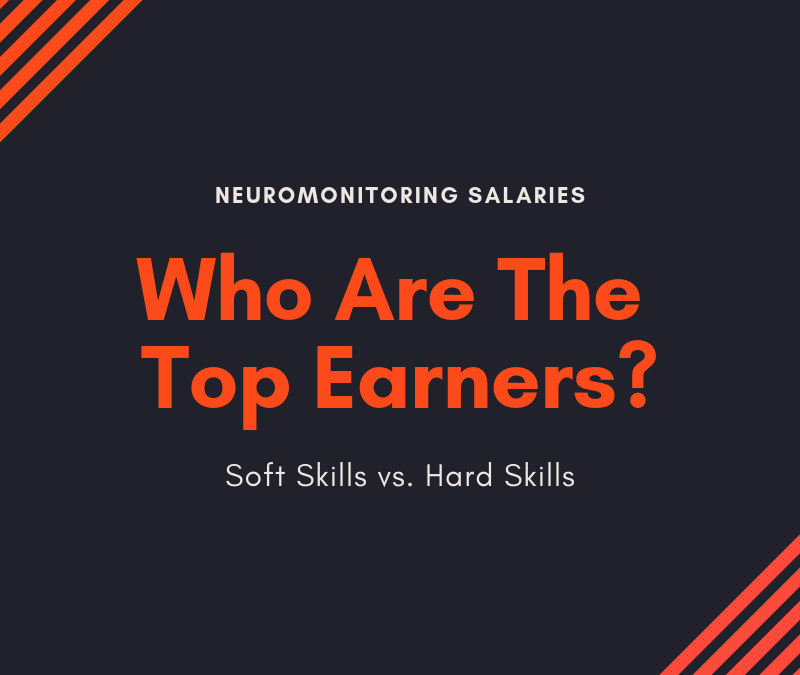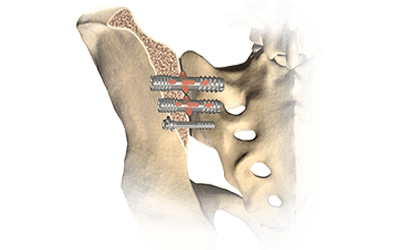Surgical Neurophysiologist Jobs That Pay
Looking back over the past decade of money being paid to a neuromonitoring technologist, there’s been some waxing in waning in the surgical neurophysiologist salary category as to who deserves the higher salary.
10+ years ago, business owners looked at their open positions with very different questions running through their heads. Those looked more like:
How can I find someone with a background that lends itself to monitoring cases in the operating room?
and
How can I find someone that’s not going to get freaked out by the OR and make this a career for the long run?
Reviewing a pool of applicants with that rattling around in your head makes the candidates with strong neuroanatomy and electrophysiology backgrounds stand out. For some, it made the interview more of a sales pitch to get those candidates than it did an actual interview to assess for fit.
So when supply isn’t keeping up with demand, the solution is to just throw some money at the problem.
What was the result?
Teams ended up with a couple of very smart people who would be described as “difficult,” or at least that’s a much nicer way of putting it.
And guess what… it turns out it is very hard to change someone’s personality. Who knew?
And Then Things Changed… Like They Always Do
Over the past 5-7 years, there were 3 rather big changes in the field that would change the conversation in an owner/hiring manager’s head.
- Small companies combined with larger ones and got a little more sophisticated – not that there were smarter people or anything in big companies. They just had more stories to compare and varying experiences to fall back on. Not to mention the ability to dedicate jobs like recruiting and hiring to specific people. That focused attention and improved processes should result in more applicants and a better selection process.
- Word got out to other professionals and supply started to exceed demand – audiologist, PhDs, and neurodiagnostic technicians were early in the space. Chiropractors, neuroscience degrees, exercise physiologist, and the like started coming in a little later. And all of a sudden, companies had more options.
- Reimbursement went down as it did for most of the healthcare providers – should a doctor have higher salary expectations than someone with a bachelor? Probably. And there were some groups out there that used “we only hire doctors” as their unique selling proposition. But you probably don’t need a whole team of doctors to make things work and shrinking reimbursement made it more difficult to sustain that type of company.
Now, hiring managers are having a different conversation with themselves. As they are looking at a much larger pile of applications, they start thinking:
Who is going to be a good fit for the team and surgeons we work with?
and
Who has the temperment that will lock down accounts and grow the businesses?
There’s been a gradual shift to prioritizing soft skills.
Where the technical skills used to not only get you the job but also the big salaries, now it gets you the interview. Well, that’s not 100% accurate. You might end up with a higher starting salary, or be more likely to find yourself as a trainer or manager, but the gap is more narrow than it used to be.
In addition to that, I haven’t noticed neuromonitoring specific degrees as the solution, either.
Again, you’ll get the interviews and recruiters knocking on your door, but you’re going to need to do well on the interview.
With the cost of tuition as high as it is, I typically do not recommend people go for more school with the sole intention of helping out their neuromonitoring salary expectations. If you have the initial credentials to get interviews, the cost-to-payout usually doesn’t make sense. If you’re in the field already, what you’ve done up to that point is more impressive than an additional masters degree. If you end up going for a master or doctorate, do it because for the knowledge.
(The above, along with the majority of the post, is my opinion limited to my own experiences. I get asked the question “should I go back to school” a lot, so I felt I needed to address it.)
So you’re saying sharpen my soft skills… as a salesperson might?
Well, yes.
But not so you can get good at cold calling or anything like that.
The truth is, you’re always selling. Or at least you should be.
When they look at malpractice lawsuits, the surgeons with the fewest lawsuits are not necessarily the most skilled. They are the ones with the best patient satisfaction surveys. Those doctors are really selling themselves – being informative, being entertaining, being engaging, listening to their patients, exuding confidence and not arrogance, and so on.
There’s a real cost to doctors who can’t sell. Is it too far of a stretch to think the same about us?
You should be selling yourself to your patients, surgeons, the hospital staff, managers, peers, direct report, support team, etc. Pretty much everyone at all times.
Always Be Closing
And when you’re always closing, by giving someone else what they need before what you need, that really starts to rack up some good old relationship currency.
Oh, you haven’t heard of relationship currency before? It’s a real thing. And when you collect enough of it, over time, it turns into real currency. The kind of currency you can use to pay back those student loans you’re currently taking on because I took my sweet ass time getting this post out.
Sorry about that.
When your week is already booked ahead of time because surgeons request you, nurses tell your managers they love you every chance they get, managers hearing it all without the slightest bit of surprise, peers see you as a leader even though you have no authority over them, well, you are on your way, my friend.
If you’re interested in being valued, it’s on you to make yourself valuable.
And don’t let something as easy as learning craniotomies deplete all that relationship currency. In comparison, taking a couple of months to drown yourself in education material is such a small amount of energy expenditure vs building up all that goodwill.
FACT: everything I’ve said to this point is true… but also fluff.
Taking over 1,000 words to point out the pretty obvious doesn’t make for a very useful post. The real meat comes in the form of showing you how to do it.
Well, there are a lot of better resources out there that specialize in just that. If those 1,000 words pre-sold you on the need to manage your own career and then pointed you to a resource that can show you how to systematically accomplish this, then I’ll call it a success.
One of my favorite resources for managing your career is in the form of a podcast. The team at manager tools (which you need to listen to if you’re a manager or want to become one) have a podcast called career tools. Really, really good stuff. Things they don’t teach in high school or college, but you’ll absolutely want your kids to know.
And if you’re not into podcasting, give it a shot. Not only do I feel like I’m learning a ton in what used to be dead time, but I’m not even bothered by long trips in the car or to the airport anymore.
Getting smarter with little effort and taking the sting out of the travel portion of the job… sign me up. Give it 6 weeks before you poo-poo it.
Just don’t listen to the podcast while you’re at the hospital. Headphones in an employee’s ears is universally hated (and that goes double for vendors).

Joe Hartman
Joe came into the neuromonitoring field as a board-certified chiropractic neurologist with an interest in neurodiagnostics. After earning a diplomate from the American Board of Neurophysiologic Monitoring, he started IntraoperativeNeuromonitoring.com as a resource for other surgical neurophysiologist looking to learn and discuss all things neuromonitoring. He spends more time tinkering on this website in his spare time than he cares to admit.
Want new articles before they get published?
Subscribe to our Awesome Newsletter.
Keep Learning
Here are some related guides and posts that you might enjoy next.
How To Have Deep Dive Neuromonitoring Conversations That Pays Off…
How To Have A Neuromonitoring Discussion One of the reasons for starting this website was to make sure I was part of the neuromonitoring conversation. It was a decision I made early in my career... and I'm glad I did. Hearing the different perspectives and experiences...
Intraoperative EMG: Referential or Bipolar?
Recording Electrodes For EMG in the Operating Room: Referential or Bipolar? If your IONM manager walked into the OR in the middle of your case, took a look at your intraoperative EMG traces and started questioning your setup, could you defend yourself? I try to do...
BAER During MVD Surgery: A New Protocol?
BAER (Brainstem Auditory Evoked Potentials) During Microvascular Decompression Surgery You might remember when I was complaining about using ABR in the operating room and how to adjust the click polarity to help obtain a more reliable BAER. But my first gripe, having...
Bye-Bye Neuromonitoring Forum
Goodbye To The Neuromonitoring Forum One area of the website that I thought had the most potential to be an asset for the IONM community was the neuromonitoring forum. But it has been several months now and it is still a complete ghost town. I'm honestly not too...
EMG Nerve Monitoring During Minimally Invasive Fusion of the Sacroiliac Joint
Minimally Invasive Fusion of the Sacroiliac Joint Using EMG Nerve Monitoring EMG nerve monitoring in lumbar surgery makes up a large percentage of cases monitored every year. Using EMG nerve monitoring during SI joint fusions seems to be less utilized, even though the...
Physical Exam Scope Of Practice For The Surgical Neurophysiologist
SNP's Performing A Physical Exam: Who Should Do It And Who Shouldn't... Before any case is monitored, all pertinent patient history, signs, symptoms, physical exam findings and diagnostics should be gathered, documented and relayed to any oversight physician that may...








0 Comments